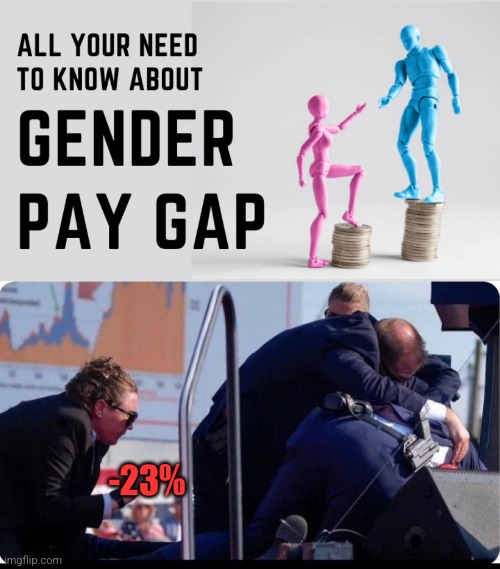The Secret Service wage gap is a pressing issue that has garnered attention in recent years, highlighting disparities in compensation within this vital federal agency. As the protectors of national leaders and key events, the men and women of the Secret Service deserve a fair and equitable wage. In this article, we will delve into the intricacies of the Secret Service wage gap, exploring its causes, implications, and potential solutions.
In the realm of federal employment, wage disparities can reflect broader societal issues such as gender bias and systemic inequities. The Secret Service is no exception, with reports indicating significant differences in pay based on various factors. Understanding the context and details surrounding this wage gap is essential for fostering an equitable workplace.
This article aims to provide a comprehensive overview of the Secret Service wage gap, its implications for employees, and the necessary steps to address these disparities. We will explore data, statistics, and expert opinions to shed light on this critical topic that affects the lives of many dedicated professionals.
Table of Contents
- 1. Overview of the Secret Service
- 2. What is the Secret Service Wage Gap?
- 3. Causes of the Wage Gap
- 4. Impact on Employees
- 5. Comparison with Other Federal Agencies
- 6. Potential Solutions
- 7. Key Statistics and Data
- 8. Conclusion
1. Overview of the Secret Service
The United States Secret Service was established in 1865, primarily to combat currency counterfeiting. Over the years, its role has evolved significantly, now encompassing two main missions: protection and investigations. The agency is tasked with safeguarding the President, Vice President, and visiting foreign dignitaries, as well as conducting financial and electronic crimes investigations.
With a workforce comprising special agents and uniformed officers, the Secret Service plays a critical role in ensuring national security. However, like many federal agencies, it faces challenges related to employee compensation and wage disparities.
2. What is the Secret Service Wage Gap?
The Secret Service wage gap refers to the differences in pay between employees within the agency, often influenced by factors such as gender, race, and job classification. This gap can lead to significant disparities in earnings, affecting employee morale and retention.
Reports indicate that female agents and officers often earn less than their male counterparts for similar roles, highlighting a troubling trend that mirrors broader societal wage gaps. Understanding the nuances of this issue is crucial for advocating for fair compensation practices.
Key Definitions
- Wage Gap: The difference in earnings between different groups of employees.
- Equal Pay for Equal Work: The principle that individuals should receive the same pay for performing the same job, regardless of gender or other factors.
3. Causes of the Wage Gap
Several factors contribute to the Secret Service wage gap, including:
- Gender Disparities: Systemic biases often result in women being paid less than men for similar roles.
- Job Classification: Differences in job responsibilities and classifications can lead to varying pay scales.
- Negotiation Practices: Research shows that women are less likely to negotiate salaries, impacting their overall compensation.
4. Impact on Employees
The wage gap within the Secret Service can have profound effects on employees, including:
- Moral and Job Satisfaction: Disparities in pay can lead to decreased morale and job satisfaction among employees.
- Retention Issues: Employees may seek opportunities elsewhere if they feel undervalued and underpaid.
- Workplace Culture: A lack of equity in compensation can foster a negative workplace culture, impacting teamwork and collaboration.
5. Comparison with Other Federal Agencies
When comparing the Secret Service wage gap to other federal agencies, it's essential to recognize patterns and disparities across the board. Many federal employees experience wage gaps, but the extent varies by agency and job classification.
For example, agencies such as the Federal Bureau of Investigation (FBI) and the Central Intelligence Agency (CIA) have also faced scrutiny regarding wage disparities. Comparing compensation practices can provide insights into potential solutions for the Secret Service.
6. Potential Solutions
Addressing the Secret Service wage gap requires a multifaceted approach, including:
- Policy Revisions: Implementing policies that promote equal pay for equal work can help mitigate wage disparities.
- Training and Awareness: Providing training on negotiation techniques and compensation awareness can empower employees.
- Regular Audits: Conducting regular pay audits can help identify and address wage gaps proactively.
7. Key Statistics and Data
Data from various studies and reports provides insight into the Secret Service wage gap:
- According to a 2021 report, female Secret Service agents earned approximately 80% of what their male counterparts made.
- The wage gap in the Secret Service is larger than the national average wage gap of 82 cents on the dollar for women.
8. Conclusion
The Secret Service wage gap is a significant issue that reflects broader societal challenges related to compensation equity. By understanding the causes and implications of this wage gap, stakeholders can work towards implementing effective solutions to promote a fair and equitable workplace.
We encourage readers to engage in discussions surrounding this topic, share their thoughts in the comments, and explore further articles on the importance of wage equity in federal employment.
Call to Action
If you found this article informative, please consider sharing it with others who may benefit from understanding the Secret Service wage gap. Together, we can advocate for fair compensation practices in all sectors.
Thank you for reading, and we look forward to welcoming you back for more insightful content in the future!
Blake Lively In A Bikini: The Shallows And Beyond
Uk Female Prison Guard Fucked By Prisoner
Debbie Harry Naked: The Iconic Moments Of A Rock Legend


